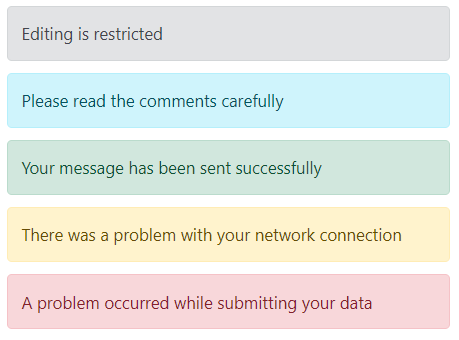How can I help you?
Icons in Message control
27 Feb 20237 minutes to read
This section explains the message with no icons, how to show or hide the close icon and add the custom severity icon to the message.
No Icon
By default, severity icons can be displayed according to the severity types to make it more understandable to the user by visual information rather than text. To hide the severity icons, set the ShowIcon property to false.
The following example demonstrates the different severity messages without the severity icons.
<div class="msg-default-section">
<div class="msg-content-section">
@Html.EJS().Message("msg-default").Severity(Severity.Normal).Content("Editing is restricted").ShowIcon(false).Render()
@Html.EJS().Message("msg-info").Severity(Severity.Info).Content("Please read the comments carefully").ShowIcon(false).Render()
@Html.EJS().Message("msg-success").Severity(Severity.Success).Content("Your message has been sent successfully").ShowIcon(false).Render()
@Html.EJS().Message("msg-warning").Severity(Severity.Warning).Content("There was a problem with your network connection").ShowIcon(false).Render()
@Html.EJS().Message("msg-error").Severity(Severity.Error).Content("A problem occurred while submitting your data").ShowIcon(false).Render()
</div>
</div>
<style>
.msg-default-section .content-section {
margin: 0 auto;
max-width: 450px;
padding-top: 10px;
}
.msg-default-section .e-message {
margin: 10px 0;
}
</style>
Custom Icon
By default, the severity icons can be displayed according to the severity type to make it more understandable to the user by visual information rather than text. If the user wants to customize these icons, it can be achieved through the CssClass property.
The following example demonstrates how the default message is rendered with a custom severity icon.
<div class="msg-custom-section">
<div class="msg-content-section">
@Html.EJS().Message("msg_icon").Severity(Severity.Info).CssClass("custom").Content("Essential JS 2 is a modern JavaScript UI Controls library that has been built from the ground up to be lightweight, responsive, modular and touch friendly. It is written in TypeScript and has no external dependencies. It also includes complete support for Angular, React, Vue, ASP.NET MVC and ASP.NET Core frameworks.").Render()
</div>
</div>
<style>
.msg-custom-section .content-section {
margin: 0 auto;
max-width: 400px;
padding-top: 10px;
}
.msg-custom-section .e-message {
margin: 10px 0;
}
@font-face {
font-family: 'Message_icons';
src: url(data:application/x-font-ttf;charset=utf-8;base64,AAEAAAAKAIAAAwAgT1MvMj8BS4YAAAEoAAAAVmNtYXDopOjpAAABiAAAADZnbHlmEsNXoQAAAcgAAAJMaGVhZCGnOH4AAADQAAAANmhoZWEIPwQDAAAArAAAACRobXR4CAAAAAAAAYAAAAAIbG9jYQEmAAAAAAHAAAAABm1heHABEAEOAAABCAAAACBuYW1l1dofAwAABBQAAAJtcG9zdNGGZXAAAAaEAAAALwABAAAEAAAAAFwEAAAAAAAD4gABAAAAAAAAAAAAAAAAAAAAAgABAAAAAQAAecv2N18PPPUACwQAAAAAAN9TeeEAAAAA31N54QAAAAAD4gO/AAAACAACAAAAAAAAAAEAAAACAQIABAAAAAAAAgAAAAoACgAAAP8AAAAAAAAAAQQAAZAABQAAAokCzAAAAI8CiQLMAAAB6wAyAQgAAAIABQMAAAAAAAAAAAAAAAAAAAAAAAAAAAAAUGZFZABA6JTolAQAAAAAXAQAAAAAAAABAAAAAAAABAAAAAQAAAAAAAACAAAAAwAAABQAAwABAAAAFAAEACIAAAAEAAQAAQAA6JT//wAA6JT//wAAAAEABAAAAAEAAAAAAAABJgAAAAQAAAAAA+IDvwANAG4AoAEBAAABLwMrATUzPwQXDwMVHxIdAQ8SFR8GMz8RPQEvESMPAicHIw8HERUfDD8JES8JIw8BNw8DFR8SHQEPEhUfBj8SPQEvESMPAgHCjwYHCAelpQcIBwaPqQMCAwECAwUGCQkIBwcHBQYEBQMDAgIBAQICAwMFBAYFBwcHCAkJBgUDAgEDBQcICQkHBgcGDQwLCwoJCAcHBgUEAwICAgIDBAUGBwcICQoLCwwNBgcHBwkJB6LJvwkIBwYFBAIBAwQFBgcECMTJBgcHCAgJBQUEBAMCAQEBAQIDBAQFBQkJBwcH/QMCAwECAwUGFRQSEREODgwLCggGBgMDAwMGBggKCwwODhEREhQVBgUDAgEDBQcICQkHBgcGGBgWFBMSDw8NCwkIBgUDAwUGCAkLDQ8PEhMUFhgYBgcHBwkJBwElfwQEAqgBAgMFfwQDBAgICAgHBwYHCAkJCQkKCgsLCgwLDAsMDAsMCwwKCwsKCgkJCQkIBwYHBwgICAgHBwUDAQIDBAoMDAwNDQ4PDg8QEBAQEBEREBAQEBAPDg8ODQ0MDAwKBAMCAQMFerMBAgQFBgcECP7/CAgHBgYDAgEBsgUDAgEBAwMEBAUFBQYGAnYGBgYFBQQEAwIBAgROBAMICAgIBwcGERMTFRUWFxcYGRkaGhsbGxsbGxoaGRkYFxcWFRUTExEGBwcICAgIBwcFAwEBAQMEFRUXGBkaGxsdHR4eHx8gICAgHx8eHh0dGxsaGRgXFRUEAwIBAwUAAAAAEgDeAAEAAAAAAAAAAQAAAAEAAAAAAAEADQABAAEAAAAAAAIABwAOAAEAAAAAAAMADQAVAAEAAAAAAAQADQAiAAEAAAAAAAUACwAvAAEAAAAAAAYADQA6AAEAAAAAAAoALABHAAEAAAAAAAsAEgBzAAMAAQQJAAAAAgCFAAMAAQQJAAEAGgCHAAMAAQQJAAIADgChAAMAAQQJAAMAGgCvAAMAAQQJAAQAGgDJAAMAAQQJAAUAFgDjAAMAAQQJAAYAGgD5AAMAAQQJAAoAWAETAAMAAQQJAAsAJAFrIE1lc3NhZ2VfaWNvbnNSZWd1bGFyTWVzc2FnZV9pY29uc01lc3NhZ2VfaWNvbnNWZXJzaW9uIDEuME1lc3NhZ2VfaWNvbnNGb250IGdlbmVyYXRlZCB1c2luZyBTeW5jZnVzaW9uIE1ldHJvIFN0dWRpb3d3dy5zeW5jZnVzaW9uLmNvbQAgAE0AZQBzAHMAYQBnAGUAXwBpAGMAbwBuAHMAUgBlAGcAdQBsAGEAcgBNAGUAcwBzAGEAZwBlAF8AaQBjAG8AbgBzAE0AZQBzAHMAYQBnAGUAXwBpAGMAbwBuAHMAVgBlAHIAcwBpAG8AbgAgADEALgAwAE0AZQBzAHMAYQBnAGUAXwBpAGMAbwBuAHMARgBvAG4AdAAgAGcAZQBuAGUAcgBhAHQAZQBkACAAdQBzAGkAbgBnACAAUwB5AG4AYwBmAHUAcwBpAG8AbgAgAE0AZQB0AHIAbwAgAFMAdAB1AGQAaQBvAHcAdwB3AC4AcwB5AG4AYwBmAHUAcwBpAG8AbgAuAGMAbwBtAAAAAAIAAAAAAAAACgAAAAAAAAAAAAAAAAAAAAAAAAAAAAAAAgECAQMABWF1ZGlvAAAA) format('truetype');
font-weight: normal;
font-style: normal;
}
.custom.e-message .e-msg-icon::before {
font-family: 'Message_icons';
content: '\e894';
}
</style>![]()
Close Icon
The message can be rendered with or without the close icon. The close icon is used to hide the message, either by manually clicking the close icon or through keyboard interaction.
By default, the close icon is not rendered in the message. To show the close icon, set the ShowCloseIcon property to true.
In the following example, the messages are rendered with the close icon.
<div class="msg-icon-section">
<div class="msg-content-section">
@Html.EJS().Button("btn1").Content("Show Default Message").CssClass("e-outline e-primary msg-hidden").Render()
@Html.EJS().Message("msg_default_icon").Severity(Severity.Normal).Content("Editing is
restricted").ShowCloseIcon(true).Closed("defaultClosed").Render()
@Html.EJS().Button("btn2").Content("Show Info Message").CssClass("e-outline e-primary e-info msg-hidden").Render()
@Html.EJS().Message("msg_info_icon").Severity(Severity.Info).Content("Please read the comments
carefully").ShowCloseIcon(true).Closed("infoClosed").Render()
@Html.EJS().Button("btn3").Content("Show Success Message").CssClass("e-outline e-primary e-success
msg-hidden").Render()
@Html.EJS().Message("msg_success_icon").Severity(Severity.Success).Content("Your message has been sent
successfully").ShowCloseIcon(true).Closed("successClosed").Render()
@Html.EJS().Button("btn4").Content("Show Warning Message").CssClass("e-outline e-primary e-warning
msg-hidden").Render()
@Html.EJS().Message("msg_warning_icon").Severity(Severity.Warning).Content("There was a problem with your network
connection").ShowCloseIcon(true).Closed("warningClosed").Render()
@Html.EJS().Button("btn5").Content("Show Error Message").CssClass("e-outline e-primary e-danger
msg-hidden").Render()
@Html.EJS().Message("msg_error_icon").Severity(Severity.Error).Content("A problem has been occurred while submitting
your data").ShowCloseIcon(true).Closed("errorClosed").Render()
</div>
</div>
<script>
document.getElementById("btn1").onclick = function (e) {
var msgDefault = ej.base.getComponent(document.getElementById("msg_default_icon"), "message");
var defaultBtn = ej.base.getComponent(document.getElementById("btn1"), "btn");
show(msgDefault, defaultBtn);
}
document.getElementById("btn2").onclick = function (e) {
var msgInfo = ej.base.getComponent(document.getElementById("msg_info_icon"), "message");
var infoBtn = ej.base.getComponent(document.getElementById("btn2"), "btn");
show(msgInfo, infoBtn);
}
document.getElementById("btn3").onclick = function (e) {
var msgSuccess = ej.base.getComponent(document.getElementById("msg_success_icon"), "message");
var successBtn = ej.base.getComponent(document.getElementById("btn3"), "btn");
show(msgSuccess, successBtn);
}
document.getElementById("btn4").onclick = function (e) {
var msgWarning = ej.base.getComponent(document.getElementById("msg_warning_icon"), "message");
var warningBtn = ej.base.getComponent(document.getElementById("btn4"), "btn");
show(msgWarning, warningBtn);
}
document.getElementById("btn5").onclick = function (e) {
var msgError = ej.base.getComponent(document.getElementById("msg_error_icon"), "message");
var errorBtn = ej.base.getComponent(document.getElementById("btn5"), "btn");
show(msgError, errorBtn);
}
</script>
<script>
function defaultClosed() {
var defaultBtn = ej.base.getComponent(document.getElementById("btn1"), "btn");
defaultBtn.element.classList.remove("msg-hidden");
}
function infoClosed() {
var infoBtn = ej.base.getComponent(document.getElementById("btn2"), "btn");
infoBtn.element.classList.remove("msg-hidden");
}
function warningClosed() {
var warningBtn = ej.base.getComponent(document.getElementById("btn4"), "btn");
warningBtn.element.classList.remove("msg-hidden");
}
function successClosed() {
var successBtn = ej.base.getComponent(document.getElementById("btn3"), "btn");
successBtn.element.classList.remove("msg-hidden");
}
function errorClosed() {
var errorBtn = ej.base.getComponent(document.getElementById("btn5"), "btn");
errorBtn.element.classList.remove("msg-hidden");
}
function show(message, btn) {
message.visible = true;
btn.element.classList.add("msg-hidden");
}
</script>
<style>
.msg-icon-section .content-section {
margin: 0 auto;
max-width: 450px;
padding-top: 10px;
}
.msg-icon-section .e-message {
margin: 10px 0;
}
.msg-icon-section .e-btn {
display: block;
margin: 10px 0;
}
.msg-icon-section .e-btn.msg-hidden {
display: none;
}
</style>![]()